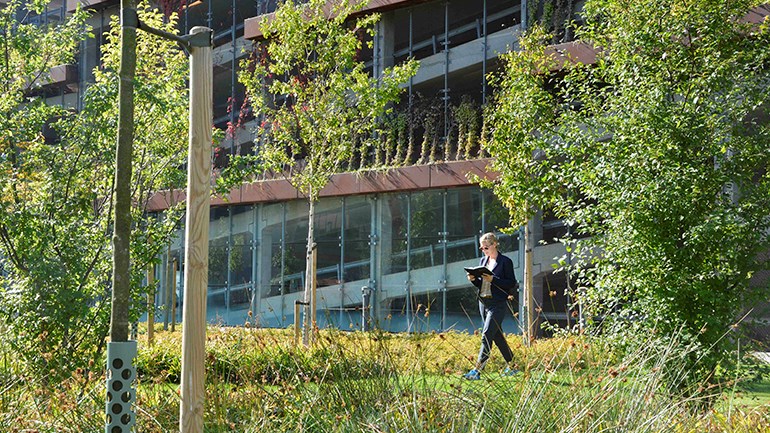The great outdoors… office!

Feel like it is not “proper work” if you take your laptop to a park and conduct video meetings from your picnic blanket? Maybe it is time to get over those feelings of guilt, says a Malmö University researcher.
The future of the workspace has been thrown into disarray since the pandemic; now there is much talk of hybrid working with a blend of work time spent in both the home and the office, but is there another option we are overlooking?
There are deep-seated norms about work and how it should be performed. Many people feel guilty if they work outside in the sun.
Charlotte Petersson Troije
Working outdoors contributes to well-being and recovery, but we seem to struggle with it as a concept, shows the first ever international study exploring office work outdoors.
“Even when we start school, we learn the importance of sitting still and concentrating, although it does not suit everyone. There is an awareness of this in school, but we do not talk much about it in relation to adults and work,” says Charlotte Petersson Troije, who conducted this interactive research project in collaboration with the City of Malmö, as well as an interdisciplinary group of researchers.
According to Petersson Troije, many work activities can be performed outdoors, even for those who work in offices. It could involve anything from meetings, working with a computer, reading, and taking a reflective break. According to the study, working outdoors contributes to a feeling of well-being, recovery, independence, improved cognition, and better social relationships, but it also brings with it feelings of guilt.
“There are deep-seated norms about work and how it should be performed. Many people feel guilty if they work outside in the sun. I see a chance for change now due to the pandemic as we change our view of work and the connection to space. But I do not think it will happen in the blink of an eye,” says Petersson Troije.
For those who work from home during the pandemic, there will be, in many cases, an unusual amount of screen time. Most meetings take place with video, and the commute that is usually required to and from work or between meetings is absent. Instead of another video meeting, switching to a "walk and talk" alternative can be a refreshing change. The research also found that it contributes to better conversations between colleagues.
“In the project, it has become clear that many important things are solved while jogging or taking a walk. It really raises the question of what counts as work or not. If we need a walk to solve a problem, then it is not worth considering it as an important part of the work rather than a way to get away from it,” says Petersson Troije.
Text: Ellen Albertsdottir and Adrian Grist